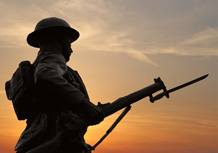
WW1 soldier with bayonet: image via Shutterstock
University of Exeter supports government funded WW1 commemoration project
2014 is the centenary commemoration of one of the most important events of the 20th century, the First World War.
The government have already announced financial support of £5.3 million, which will primarily fund the First World War Centenary Battlefield Tours Project, managed by the Institute of Education (IOE) and Education Travel Group.
The project is designed to offer two pupils and one teacher from every state-funded secondary school in England the opportunity to visit battlefields on the Western Front from Spring 2014 to 2019. The battlefield tours are a key part of the government's plans to commemorate the centenary of the First World War, through leading edge teaching and learning approaches that will enable pupils to develop a deeper understanding of the significance of WW1.
Exeter’s involvement in the Centenary Education Programme is crucial. An Arts and Humanities Research Council (AHRC) funded project ‘The First World War in the Classroom’, led by academics at Exeter and Northumbria University, is providing the data set that will inform the nature and content of the Institute of Education's WW1 Centenary Battlefield Tours Project. A survey – launching on 21 June 2013 - will establish secondary teachers' views (in English Literature and History) about the way the First World War is taught. The project team has worked closely with the IOE to ensure the Battlefield Tours Project is able to tailor their activity to teachers’ needs more closely. This kind of survey has never been undertaken before.
In the light of the forthcoming centenary commemorations, it is of vital importance in helping to understand the way young people interpret this seminal event in British and global history.
University of Exeter historian, Dr Catriona Pennell is the lead academic on the ‘First World War in the Classroom’ project. Dr Pennell and the team think that in the light of the forthcoming centenary commemorations, it is of vital importance to understand the way young people interpret this seminal event in British and global history. In taking this position, Dr Pennell explains the significance of the survey and its outcomes. She said: “the survey results will help the ‘First World War in the Classroom’ team and partners to establish an on-going and mutually beneficial dialogue between teachers and researchers interested in First World War literature and history. Teacher input will work towards improving communication between sectors and subjects and will enable the project team to create and link up resources and ideas via the project website.”
The results of the survey will be published in a comprehensive report available via the ‘First World War in the Classroom’ website and disseminated, in 2014, via the journals of the English Association and History Association.
Stuart Foster, Professor of Education at the Institute of Education, said: “As well as helping pupils to explore the Western Front in more depth, the Battlefield Tours Project will encourage them to think critically about the war’s social, economic and political consequences and its continuing significance. We are keen for the project’s impact to be widely felt. Pupils will have opportunities to work with their local communities to commemorate the centenary of the First World War, while teachers will be empowered through the project’s pioneering professional development programme to deliver more effective lessons on the War across their schools.”
Date: 12 June 2013
